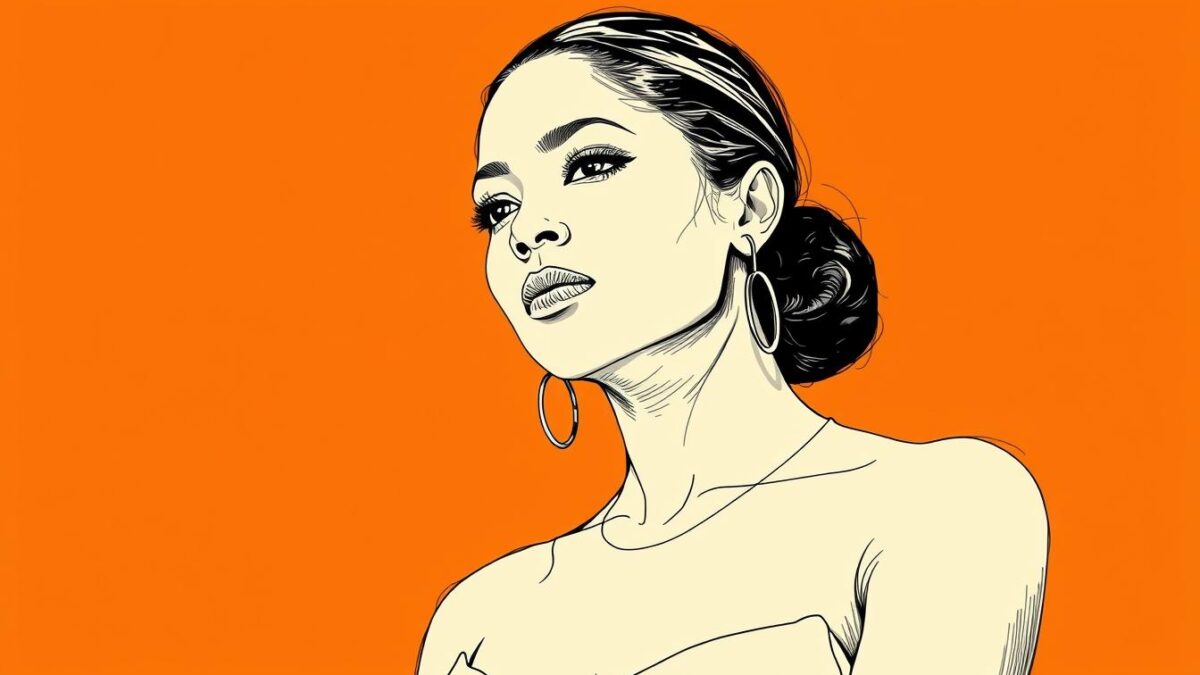A deep, resonant voice emerged from Brazil in October 1964. It belonged to a girl born in Niterói. That voice would become a national treasure.
She began her life as Zélia Cristina Gonçalves Moreira. The artist we know today found her public identity in 1992. She chose her mother’s maiden name, Duncan, embracing a new chapter.
Her vocal tone was not always celebrated. As a child, it drew unwanted attention. Yet she transformed that unique sound into her signature strength.
This singer built a career that defies simple labels. She moves through MPB, samba, pop, and rock with ease. Her professional journey started in 1981, spanning over four decades of music.
The story of Zélia Duncan is one of powerful change. From a shy teenager to a commanding stage presence. Her path redefined possibilities in a male-dominated industry.
Early Life and Beginnings
Her story starts with a move, a journey from the coast to the heartland. The singer spent her first six years in Niterói. This city sits across the bay from the vibrant Rio de Janeiro.
At age six, her family relocated to Brasília. She lived in the capital for sixteen formative years. These two distinct cities shaped her artistic view.
Childhood and Family Roots
The legacy of her mother’s family held deep meaning. The maiden name Duncan came from this lineage. It represented a history of feminine strength.
This name would later become her professional identity. It replaced her birth name, Cristina Gonçalves Moreira. The choice honored her mother and grandmother.
Early Music Influences in Brasília and Niterói
Growing up between these cities exposed her to different sounds. The coastal culture of Rio de Janeiro state met the modernism of Brasília. This blend fed her eclectic musical foundation.
At sixteen, she performed her first show in the capital. It was the earliest public test of a voice that would define decades. This moment in Brasília marked the true start of her path.
Breakthrough and Musical Evolution
The late 1980s saw a determined artist, then known as Zélia Cristina, carving out a space in Rio’s demanding music landscape. Her persistence soon yielded a crucial opportunity.
Debut Success with Outra Luz
In 1989, her show “Zélia Cristina no Caos” impressed executives from the Eldorado label. This led directly to a recording contract.
Her first LP, “Outra Luz,” arrived in 1990. It was an immediate critical success. The album earned two Prêmio Sharp nominations for Revelation and Best Pop/Rock Singer.
Collaboration with respected singer Luiz Melodia on the record added significant credibility. It connected her work to established MPB traditions.
Television appearances and performances across Brazil followed. Her reach expanded far beyond Rio’s clubs.
Transition to a Solo Career
The artist adopted her mother’s maiden name in 1994. This change coincided with the release of her self-titled album.
That record sold an impressive 160,000 copies. It firmly established her commercial success. This period marked her evolution from a promising newcomer to a major national artist.
It was a breakthrough that would define the next three decades of her career.
Defining Career Milestones
A single tape recording in 1981 set a powerful career in motion. She entered a contest for new artists at Rio de Janeiro’s Sala Funarte. Winning that competition was her first major professional break.
It led directly to her debut performance. Success there opened another door.
Winning the Arts Competition and First Performances
The victory earned her a coveted spot in the Pixinguinha project. She represented Brasília, touring Brazil’s Northeast. This was a formative time for the young artist.
She accompanied established musicians Cida Moreira and Wagner Tiso. These early years were a masterclass in stagecraft.
Performance Highlights Across Brazil
At age 22, she returned to Rio de Janeiro, ready for a solo career. She performed under the name Zélia Cristina. The city’s music scene was demanding.
To support herself, she took various jobs. She worked as a backing vocalist for singer José Augusto. She also DJ’d on Rádio Fluminense FM.
Her own performances began to spread. She played shows in major cities like São Paulo, Florianópolis, and Porto Alegre.
This period of grinding work laid a solid foundation. Every city added to her reputation. These experiences prepared her for the success that followed.
Legacy and Influence of Zélia Duncan
Two significant events converged in 1992 to forge a new path for the Brazilian singer. This period marked a professional rebirth and deeper artistic connection.
Adopting Her Mother’s Maiden Name
The artist made a defining choice that year. She replaced Cristina Gonçalves Moreira with her mother’s family name.
Warner’s president in Brazil suggested the change. Producer Beth Araújo supported this fresh identity. It honored her maternal lineage and feminine legacy.
Artistic Inspirations from Joni Mitchell
Joni Mitchell’s influence shaped the singer’s approach to music. The Canadian artist’s genre-defying style showed new possibilities.
Mitchell’s poetic lyrics and emotional depth resonated deeply. Songs like “A Case of You” demonstrated powerful storytelling. This inspiration encouraged artistic independence and fearless creation.
The legacy built during this time continues to inspire. It blends personal history with musical innovation.
Collaborations with Music Icons
The year 2006 marked a turning point in musical alliances that would test friendships. Working with Brazil’s most influential artists revealed both artistic growth and personal challenges.
Dynamic Partnership with Rita Lee
Rita Lee, Brazil’s undisputed queen of rock, represented a significant relationship for the singer. Their connection faced strain when an invitation arrived in 2006.
The psychedelic rock band Os Mutantes announced their return to the stage. They asked the artist to join as a full member. This decision created tension with Rita Lee.
Lee had been expelled from the same band decades earlier. Despite giving initial approval, she apparently struggled with seeing another woman step into that role. The tour proved successful, but the friendship revealed complex dynamics between two powerful artists.
Tribute to Cássia Eller and Other Legends
Cássia Eller’s influence shaped artistic development in profound ways. As Brazil’s rock princess, Eller left a lasting legacy on the 1990s scene.
Her androgynous stage presence and bold bisexual identity made her a queer icon. During the AIDS pandemic, she emerged as a powerful voice for change.
Both Rita Lee and Cássia Eller demonstrated that Brazilian women could dominate rock music. They challenged sexual norms and used their platforms for social progress. These collaborations showed what female artists could achieve.
Impact on Brazilian Pop Culture and Social Change
The year 1995 marked a seismic shift in Brazil’s music landscape. Barriers fell as women claimed center stage in venues that had long excluded them.
Breaking Barriers in a Male-Dominated Scene
Zélia Duncan made history by becoming the first woman to headline at São Paulo’s Tom Brasil hall. This venue had previously reserved its stage exclusively for male performers.
That same year, she joined Adriana Calcanhoto, Cássia Eller, and Maria Bethânia at the JB FM commemoration. This gathering showcased Brazil’s most powerful female voices united on one stage.
These performances proved women could command major venues without male counterparts. They drew crowds and reshaped expectations in Brazilian rock and MPB.
Championing Feminine Empowerment in MPB
The singer’s deep voice challenged conventional expectations for female vocalists. She expanded what audiences would accept and celebrate in women’s music.
Duncan uses her platform to advocate for political awareness and minority rights. She understands that visibility creates responsibility for social change.
As an intersectional icon, she addresses issues facing LGBTQ+ communities and marginalized groups. Her work continues the legacy of women who challenged norms before her.
Behind every barrier-breaking woman stands a legion of supporters. Duncan’s success demonstrates the power of collective feminine strength in music.
Discography and Signature Albums
From her 1990 debut to her 2019 Latin Grammy-nominated work, each album captures a different phase of her musical journey. The discography spans fifteen releases that balance commercial appeal with artistic integrity.
Key Studio Releases and Live Recordings
The 1994 self-titled album marked her commercial breakthrough. It sold 160,000 copies and earned a Golden Record. Billboard magazine named it one of the ten best Latin albums that year.
Her 1996 release “Intimidade” moved 90,000 copies in its first month. This proved her staying power in the industry. The success cemented her status as a major seller.
Milestone Albums and Special Editions
The 2006 live recording feat. Os Mutantes captured her tenure with the legendary psychedelic rock band. This collaboration showed her versatility across genres.
Her 2019 album “Tudo É Um” earned a Latin Grammy nomination. It validated her relevance nearly three decades into her career. Zélia Duncan also contributed to songbook projects honoring Tom Jobim and Djavan.
Each release year represents artistic evolution. From raw beginnings to mature confidence, her discography tells a story of growth.
Global Tours and Memorable Performances
A five-month contract in the United Arab Emirates in late 1991 marked the beginning of her global journey. This unlikely venue provided quiet time to write her second album far from home.
Her touring schedule intensified in the mid-1990s. In 1996, she traveled through Europe, testing her appeal with new audiences.
She also began a fruitful collaboration with the Orquestra Jazz Sinfônica. Their performances together added a grand, classical dimension to her popular sound.
International Success and Touring Highlights
The year 1997 was a peak time for international shows. Zélia Duncan performed twice in Portugal and Spain.
She also opened a series of shows in New York. Later that year, she completed twelve performances across Japan.
These tours solidified her status as a Brazilian artist with genuine worldwide reach. Her music connected with listeners from Lisbon to Tokyo.
Historic Performances in Unique Settings
Some of her most memorable shows happened in São Paulo. On Father’s Day, she performed for a crowd of 30,000 people.
Another massive show in the city gathered 20,000 fans. She shared the stage with greats like Carlinhos Brown and the Orquestra Jazz Sinfônica.
Even decades later, her appeal endured. In 2008, she performed with Simone in three Portuguese cities.
Her November 2020 performance at Sala São Paulo with Mart’nália was historic. It was her first live show with an audience during the COVID-19 pandemic.
Reflections and Future Horizons
What began as a sixteen-year-old’s debut has evolved into a legacy that reshaped Brazilian music. Over forty years since that first performance, the singer’s journey charts more than personal success. It mirrors the evolution of an entire musical landscape.
Within Zélia Duncan’s career exist countless women who found strength through her example. The bullied child, the backing vocalist, the rock performer who joined Os Mutantes—each phase built upon the last. Her time in various bands, feat. collaborations, taught that growth requires both independence and partnership.
Thirty years after her breakthrough, her voice remains distinctive and her advocacy fierce. She paved the way for artists who refuse to choose between commercial success and artistic integrity. The longest careers belong to those who stay true while constantly transforming.




